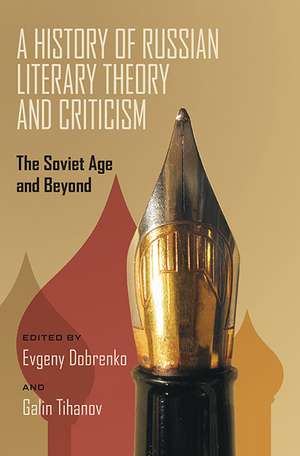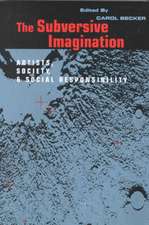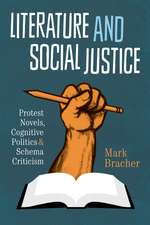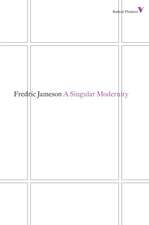A History of Russian Literary Theory and Criticism: The Soviet Age and Beyond: Russian and East European Studies
Editat de Evgeny Dobrenko, Galin Tihanoven Limba Engleză Paperback – 15 noi 2013
This volume assembles the work of leading international scholars in a comprehensive history of Russian literary theory and criticism from 1917 to the post-Soviet age. By examining the dynamics of literary criticism and theory in three arenas—political, intellectual, and institutional—the authors capture the progression and structure of Russian literary criticism and its changing function and discourse.
The chapters follow early movements such as formalism, the Bakhtin Circle, Proletklut, futurism, the fellow-travelers, and the Russian Association of Proletarian Writers. By the cultural revolution of 1928, literary criticism became a mechanism of Soviet policies, synchronous with official ideology. The chapters follow theory and criticism into the 1930s with examinations of the Union of Soviet Writers, semantic paleontology, and socialist realism under Stalin. A more “humanized” literary criticism appeared during the ravaging years of World War II, only to be supplanted by a return to the party line, Soviet heroism, and anti-Semitism in the late Stalinist period. During Khrushchev’s Thaw, there was a remarkable rise in liberal literature and criticism, that was later refuted in the nationalist movement of the “long” 1970s. The same decade saw, on the other hand, the rise to prominence of semiotics and structuralism. Postmodernism and a strong revival of academic literary studies have shared the stage since the start of the post-Soviet era.
For the first time anywhere, this collection analyzes all of the important theorists and major critical movements during a tumultuous ideological period in Russian history, including developments in émigré literary theory and criticism.
The chapters follow early movements such as formalism, the Bakhtin Circle, Proletklut, futurism, the fellow-travelers, and the Russian Association of Proletarian Writers. By the cultural revolution of 1928, literary criticism became a mechanism of Soviet policies, synchronous with official ideology. The chapters follow theory and criticism into the 1930s with examinations of the Union of Soviet Writers, semantic paleontology, and socialist realism under Stalin. A more “humanized” literary criticism appeared during the ravaging years of World War II, only to be supplanted by a return to the party line, Soviet heroism, and anti-Semitism in the late Stalinist period. During Khrushchev’s Thaw, there was a remarkable rise in liberal literature and criticism, that was later refuted in the nationalist movement of the “long” 1970s. The same decade saw, on the other hand, the rise to prominence of semiotics and structuralism. Postmodernism and a strong revival of academic literary studies have shared the stage since the start of the post-Soviet era.
For the first time anywhere, this collection analyzes all of the important theorists and major critical movements during a tumultuous ideological period in Russian history, including developments in émigré literary theory and criticism.
Din seria Russian and East European Studies
-
 Preț: 468.65 lei
Preț: 468.65 lei -
 Preț: 402.44 lei
Preț: 402.44 lei -
 Preț: 141.48 lei
Preț: 141.48 lei -
 Preț: 272.52 lei
Preț: 272.52 lei - 15%
 Preț: 678.74 lei
Preț: 678.74 lei -
 Preț: 184.58 lei
Preț: 184.58 lei - 15%
 Preț: 493.66 lei
Preț: 493.66 lei -
 Preț: 388.79 lei
Preț: 388.79 lei -
 Preț: 436.25 lei
Preț: 436.25 lei -
 Preț: 295.91 lei
Preț: 295.91 lei -
 Preț: 461.94 lei
Preț: 461.94 lei -
 Preț: 127.24 lei
Preț: 127.24 lei -
 Preț: 123.55 lei
Preț: 123.55 lei -
 Preț: 433.53 lei
Preț: 433.53 lei -
 Preț: 363.26 lei
Preț: 363.26 lei -
 Preț: 182.40 lei
Preț: 182.40 lei -
 Preț: 432.57 lei
Preț: 432.57 lei -
 Preț: 474.45 lei
Preț: 474.45 lei -
 Preț: 426.63 lei
Preț: 426.63 lei -
 Preț: 502.16 lei
Preț: 502.16 lei -
 Preț: 431.62 lei
Preț: 431.62 lei -
 Preț: 113.42 lei
Preț: 113.42 lei -
 Preț: 422.00 lei
Preț: 422.00 lei -
 Preț: 395.54 lei
Preț: 395.54 lei -
 Preț: 179.30 lei
Preț: 179.30 lei -
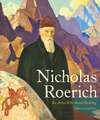 Preț: 326.41 lei
Preț: 326.41 lei -
 Preț: 403.43 lei
Preț: 403.43 lei -
 Preț: 349.81 lei
Preț: 349.81 lei -
 Preț: 428.75 lei
Preț: 428.75 lei -
 Preț: 317.63 lei
Preț: 317.63 lei -
 Preț: 315.41 lei
Preț: 315.41 lei -
 Preț: 171.58 lei
Preț: 171.58 lei -
 Preț: 422.97 lei
Preț: 422.97 lei -
 Preț: 391.67 lei
Preț: 391.67 lei -
 Preț: 485.99 lei
Preț: 485.99 lei -
 Preț: 389.76 lei
Preț: 389.76 lei -
 Preț: 238.43 lei
Preț: 238.43 lei -
 Preț: 352.86 lei
Preț: 352.86 lei -
 Preț: 465.76 lei
Preț: 465.76 lei -
 Preț: 126.00 lei
Preț: 126.00 lei -
 Preț: 283.50 lei
Preț: 283.50 lei -
 Preț: 397.45 lei
Preț: 397.45 lei - 23%
 Preț: 568.69 lei
Preț: 568.69 lei - 23%
 Preț: 565.89 lei
Preț: 565.89 lei - 23%
 Preț: 556.25 lei
Preț: 556.25 lei -
 Preț: 385.91 lei
Preț: 385.91 lei -
 Preț: 422.97 lei
Preț: 422.97 lei -
 Preț: 385.53 lei
Preț: 385.53 lei -
 Preț: 423.35 lei
Preț: 423.35 lei -
 Preț: 386.88 lei
Preț: 386.88 lei
Preț: 459.98 lei
Nou
Puncte Express: 690
Preț estimativ în valută:
88.04€ • 91.55$ • 73.67£
88.04€ • 91.55$ • 73.67£
Carte tipărită la comandă
Livrare economică 15-29 martie
Preluare comenzi: 021 569.72.76
Specificații
ISBN-13: 9780822962861
ISBN-10: 0822962861
Pagini: 424
Dimensiuni: 152 x 229 x 25 mm
Greutate: 0.54 kg
Ediția:1
Editura: University of Pittsburgh Press
Colecția University of Pittsburgh Press
Seria Russian and East European Studies
ISBN-10: 0822962861
Pagini: 424
Dimensiuni: 152 x 229 x 25 mm
Greutate: 0.54 kg
Ediția:1
Editura: University of Pittsburgh Press
Colecția University of Pittsburgh Press
Seria Russian and East European Studies
Recenzii
“This is a uniquely important book. Unique, because there is no other serious scholarly history that encompasses the whole spectrum of modern Russian literary theory and criticism. Important, because the schools and thinkers who are studied in this anthology have played a crucial role in shaping debates about literature and its relation to society all over the globe. The authors of the different chapters constitute a who’s who of contemporary Slavic scholarship, and they cover every significant move from the October Revolution to the post-Soviet present, including émigré developments. No responsible student of modern literary theory can ignore this instant classic.”
—Michael Holquist, Yale University
—Michael Holquist, Yale University
“For those of us whose knowledge of Russian literary theory and criticism is restricted to a few works by the Russian formalists and Bakhtin, this wide-ranging collection, which treats criticism as both a social institution and intellectual activity, is valuable and revealing.”
—Jonathan Culler, Cornell University
—Jonathan Culler, Cornell University
“This book is a necessary compendium for anyone looking to understand the history of Russian literary scholarship in its international contexts and wanting to experience the intellectual joy of reading Soviet and Russian literary theory. Its brilliantly written contributions destroy old (and often self-serving) mythologies, they reveal unknown facts and new perspectives on their interpretation, and they thus make a significant contribution to our understanding of the Soviet and post-Soviet era.”
—Hans Ulrich Gumbrecht, Stanford University
—Hans Ulrich Gumbrecht, Stanford University
“What makes this collection of essays so interesting . . . not so much biographical sketches that we see but the back-room politics of literary criticism in a super-heated environment where classic authors are revered or dismissed, per whatever political ideology is in place.”
—The Black Sheep Dances
—The Black Sheep Dances
“The first of its kind, and as such it establishes a canon and illuminates the hereto dimly lit corners of Russian cultural history. A necessary addition to the shelf of every Slavist.”
—The NEP Era
—The NEP Era
“The absence of ‘a comprehensive and methodologically sophisticated history’ of Russian theory and criticism has made itself felt over decades, but readers now have this invaluable volume to guide them through a complex period in the development of Russian culture.”
—Journal of European Studies
—Journal of European Studies
“The greatest strength of 'A History' is the way it brings the subject of criticism back to the fore in Russian literary studies. Modern criticism began in the Slavic world out of a desire to ask different questions with different vocabularies so as to stop knowing only what reason knows. Today, criticism has become an applied field of sorts, similar, in a sense, to pedagogy, geared more towards divining what a text presumably means rather than the making of meaning itself. By bringing the spirit of criticism to life, the essays of 'A History' invite readers to think again about criticism and to actively participate in its renewal and extension into the twenty-first century."
--Slavic and East European Journal
--Slavic and East European Journal
Notă biografică
Evgeny Dobrenko is professor and department head of Russian and Slavonic Studies at the University of Sheffield. He is author, editor, or coeditor of twenty books including The Cambridge Companion to Twentieth-Century Russian Literature and Soviet Culture and Power: A History in Documents, 1917-1953.
Galin Tihanov is the George Steiner Professor of Comparative Literature at Queen Mary, University of London. He is the author or editor of numerous books, including The Master and the Slave: Luka’cs, Bakhtin, and the Ideas of Their Time and Enlightenment Cosmopolitanism.
Galin Tihanov is the George Steiner Professor of Comparative Literature at Queen Mary, University of London. He is the author or editor of numerous books, including The Master and the Slave: Luka’cs, Bakhtin, and the Ideas of Their Time and Enlightenment Cosmopolitanism.
Descriere
This volume assembles the work of leading international scholars in a comprehensive history of Russian literary theory and criticism from 1917 to the post-Soviet age. By examining the dynamics of literary criticism and theory in three arenas—political, intellectual, and institutional—the authors capture the progression and structure of Russian literary criticism and its changing function and discourse. For the first time anywhere, this collection analyzes all of the important theorists and major critical movements during a tumultuous ideological period in Russian history, including developments in émigré literary theory and criticism.
Winner of the 2012 Efim Etkind Prize for the best book on Russian culture, awarded by the European University at St. Petersburg, Russia.
Winner of the 2012 Efim Etkind Prize for the best book on Russian culture, awarded by the European University at St. Petersburg, Russia.
